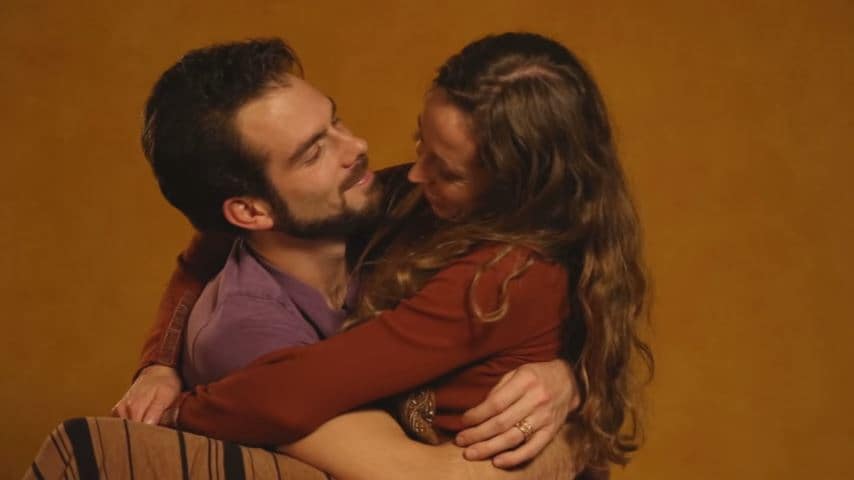“’Til death do us part,” has always been replaced in my mind with, “’Til next Tuesday, then…we’ll see.”
When I was a child, I used to play house. Like most children, I would mimic what I grew up with, so, of course, I was often a single mother. I did have a healthy example of a relationship through my grandparents who to this are completely and madly in love. While I realize that high levels of commitment are possible, I tend to find them improbable, and have never desired them in my own life. I haven’t entertained the concept of marriage or long-term monogamy since back in the days of cabbage patch kids when I would receive pretend phone calls from a pretend absentee husband (who was always named after the boy I had a current crush on) telling me he’d be late again and to go ahead and start pretend dinner without him.
In my more recent romantic endeavors, which are slightly more real, I still never pretend to say forever. I’m the kind of person who changes so much from day to day, let alone year to year, that I think it’s unfair to make such a promise when you know it can’t be kept. I believe that marriage is great for some people, but fewer than we’re willing to admit, and definitely not me. “’Til death do us part,” has always been replaced in my mind with, “’Til next Tuesday, then…we’ll see.” So the thought of weddings seemed as make-believe as the phone calls I was receiving from Scott when I was seven years old in my playroom kitchen.
I’ve been lucky enough to have a lot of queer friends, who up until recently didn’t even have the legal right to exchange vows, in addition to a lot of nomadic wanderers like myself who are equally either against or afraid of commitment. Those I know who are married were already in their matrimonial state when I found them, and lucky for me, I’ve never had to buy a dress just to watch them prove their love for one another. This luck has lasted for about fifteen years, but came to an abrupt end this last winter.
My current partner, like so many others, has a family. And his family, also like so many others, likes to get together around the holidays. His cousin happened to plan her wedding on January 2 in Florida. A strange date to me, but who am I to judge? This date happened to be a great way to ensure that everyone’s holidays revolve around a one special bride. Because it’s really the only time of year his family sees him, he was guilted into attending this silliness. Now, I’m not big on holidays, but I love New Years Eve. I also love trips to Florida, hotel sex, and free cake. I was promised all of these if I were to accompany him on this journey. So I went. And I discovered a few things, including but not limited to: weddings are weird.
The first thing I learned was that weddings have websites. As if the bride and groom are comedians trying to get road gigs, they’ve got an “about” page, a bio, and a schedule of events. Upon visiting their dot com, I discovered many things about the bride and groom. Apparently the bride was romantically sleeping off a headache before she came out of the bedroom. That’s when the groom got down on one knee! They like each other because they both like board games. Amazing that two people with such distinct similarities could ever have found each other. The schedule of events page at one point actually read, “the bride and groom will then go to their room, and be in there for approximately a half hour, before coming down to the reception…” Did they just tell us they were gonna fuck?! I’m sorry. “Consummate?” And a half hour? I can’t tell if they’re joking.
Before the ceremony
So we drive from California to Daytona where we meet his family with the usual, “hey how are ya, nice to meet ya, please don’t think of me as your next daughter-in-law…” greetings. Oh, did I mention I hadn’t met his parents yet? Yeah, so that happens. It’s fine. When you’re in a place surrounded by alligators, your partner’s parents don’t seem so bad.
The next day is the big event. Until now the only weddings I’d ever attended were Catholic, so I’m expecting a long ceremony including a full mass and no kiss at the end. I’m wrong. I’ve already had much of the hotel sex I’d been promised so I’m in a fairly good mood. It also helps that the wedding was not at a church, but rather held on a large patio at a hotel with a nicer pool than ours, making me wish I’d worn my swimsuit under my dress.
The ceremony
As soon as we get there, I feel as though I’m being sized-up by the entire family. I wish I’d brought a sign to wear around my neck that reads, “I’m not trying to join. I’m also not the reason he got divorced.” But I hear signs are out of fashion for weddings these days. In an attempt to keep it cool and casual, I stuff my face with hors d’oeuvres. I look around and there doesn’t appear to be any free cake just yet. Then I remember from the few weddings I’ve been to that the cake comes later. I decide I can wait, but not long.
Everyone eventually starts to head over to the chairs, set up in two separate columns, as if to say, “we like each other but we’re not family YET.” All the guests are asked to grab a rock from a basket. I think my question, “are we going to stone the bride?” is a fair one at this point. We take our seats and I learn something else about weddings: they have programs. Great, I love plays! I look for the bride’s headshot and bio with a blurb about how she’s been doing off-Broadway projects for so long and she’s super grateful to join the touring cast of RENT. It’s not there. But a schedule is, which is nice because I’m able to treat it like a countdown to cake.
The music begins and I can’t help but be distracted by a couple making out on the beach. They look like they’re really going for it, and I don’t understand why we’re all looking back at a bunch of girls in bad dresses walking awkwardly down an aisle when sexy fun times are happening right in front of us. The bride is wearing white, adding to the ever-growing list of things I don’t understand. I mean, we all read the website, right? They were living together. Am I being presumptuous when I say she’s probably not a virgin anymore? Maybe it’s possible with this couple, but honestly, why are we all so inclined to pretend? It’s like the “ooos” and “aaahhhs” that come out of everyone’s mouths as they look at the people marching one by one. It all feels so rehearsed, and why? BECAUSE IT IS! They rehearse these things! “Ooooo, the bride is glowing!” Well sure she is, and so are all of us. This is Florida, and that’s not glow, that’s sweat.
Dad symbolically kisses the bride goodbye forever, like he’s never going to see her again, before sitting in the front row where he’s got a better view of her now than he did when she went to college. “Goodbye forever…or until you move back in with me and your mom because you realize you shouldn’t have spent so much on a wedding and should’ve used that money for a down payment on a house.”
The next thing that happens is possibly my favorite thing in the world. The bride’s aunt gets up to speak. She reads a passage from one of the bride’s favorite books, which happens to be a Winnie the Pooh book. It’s cute because it’s about friends that last forever, but that’s not why I’m so psyched. The passage begins with the words, “Pooh is in me, Pooh is in all of us.” How am I not supposed to laugh?!?! WHY IS NO ONE ELSE LAUGHING?!?!?!
The man wearing the white collar tells us to think a positive thought for the bride and groom and put that energy into the rock before we pass the rock toward the middle of the aisle where someone with a basket will collect it. Great, I don’t even get to keep the rock?! Fine, I wish them good sex for as long as they can stand each other and the courage to get out of it if and when they ever feel it’s time before passing my rock to the middle.
As people are talking about forever, I can’t help but think to myself, how can you be so bold? How can anyone make a promise even for tomorrow, in a world where literally the only thing that’s for sure is change? How do you know you’re still going to be boring two years from now? Let alone fifty?! Why are you doing this to yourself? You’re an American woman who can buy her own land! You don’t need this. And his family doesn’t need goats in exchange for you. So why go through all of it? If you need the attention, become an actor.
The wedding is officially over and it’s time for cake! No? Still no cake?! Oh great, pictures. My partner’s mom tries to get me to pose with the family. I politely decline, three times. After two it feels a little less polite but I just don’t want to be a part of this memory. I want to be like a ghost. You feel my presence but you can’t quite put a finger on just how I look or what I say or how much cake I eat. Speaking of cake…
The reception
We head up to the reception and the bride and groom theoretically head up to their room to fuck like they said they would. I finally get some free food, and quickly realize that nothing’s free. My asparagus and potatoes come at the cost of waiting through several speeches before my partner’s mother switches her seat so she can sit next to me and attempt a Spanish Inquisition about her son, and myself, and how we met. It’s as though she’s expecting a sweet, romantic story. I tell her “online” and am vague with my answers in hopes to shut it down.
Throughout the evening, people cling on their glasses prompting the bride and groom to kiss. That’s right, like dogs with a pre-conditioned response. It’s Pavlov’s kiss. I can only hope this trained response carries over into their day-to-day lives. Maybe after the honeymoon, he’s at a work meeting and someone at the conference table accidentally hits their water glass with a pen. Next thing you know, he’s planting a big wet one on his boss. “Oops. Sorry about that, boss. I just got married.” “Ahh,” everyone gets it and laughs it off because he’s trained now.
I think it’s important to mention that I’m a person who likes to play games when she’s bored. So, I begin to play a game with my partner. I tell him that every time we hear the group say “Aw” at something adorable and/or sickeningly sweet, it’s one more guy that gets added to the gangbang he owes me for coming to this wedding. We may not be quite as traditional as the bride and groom, but we like games just as much!
So, we’ve watched the ancient tradition of a woman being given away as though she’s switching owners. We’ve also watched a series of awkward dances while I successfully avoided the dance floor myself, not because I don’t love dancing, but because I feel twerking is inappropriate in front of Christian grandparents with heart conditions. I’ve also successfully avoided pretending like I care about catching fake flowers at the end of the night. And best of all, I finally get my cake!!!
So, why do we get married?
The night was as successful as it could be, but I can’t help but wonder why this all still happens? Why do we still feel the need? I understand there are tax breaks that come with marriage, and certain rights that a married couple has that no one else does, like insurance coverage and other protections. But it doesn’t seem to be about that. If it were, everyone would just do this in a courtroom. So why? Why do people who are supposedly utterly and completely in love feel a need to go through this whole charade? And why is it so highly valued by some? I’ve grown up with girls whose main goal in life was marriage, and who feel like they’re not whole until they find someone to take through this archaic ritual.
It’s my understanding that love is between the people who are in it, and if it’s real, it doesn’t need to be shouted about. If you happen to be a person who needs a promise of forever, why do these particular traditions stick around? Why does the female need a rock that was probably found by an African living a terrible life just so some woman living across the globe can have something shiny on her finger? Why does she wear a big white dress to pretend like she’s this pristine, virginal thing when really she’s someone who should be proud of her past, whether it’s peppered with mistakes or not, because it’s what got her to where she is now? Why does the groom dress like all the other men and just stand there while he’s “given” a woman, “his” woman? Why is there an aisle? Why do all of these people need to be here to watch? When you look at it, really look at it, the only thing that makes sense about a wedding is the cake. I know why there’s cake.
The entire event left me feeling like an alien or a time traveler who knows the truth but can’t say anything because it’ll mess with the time space continuum. So I’ll say it now: if you’re in love, just be in love, for however long, with whomever it happens to be with. Be nice to each other. Listen to each other. Talk to each other. And if it fades away or becomes less fun, then allow each other to go your separate ways amicably and know that you’ll always have those beautiful memories of great hotel sex.





![[Image: @OcetiCampNews]](https://www.lovetv.co/wp-content/uploads/2016/11/oceti.jpg)



